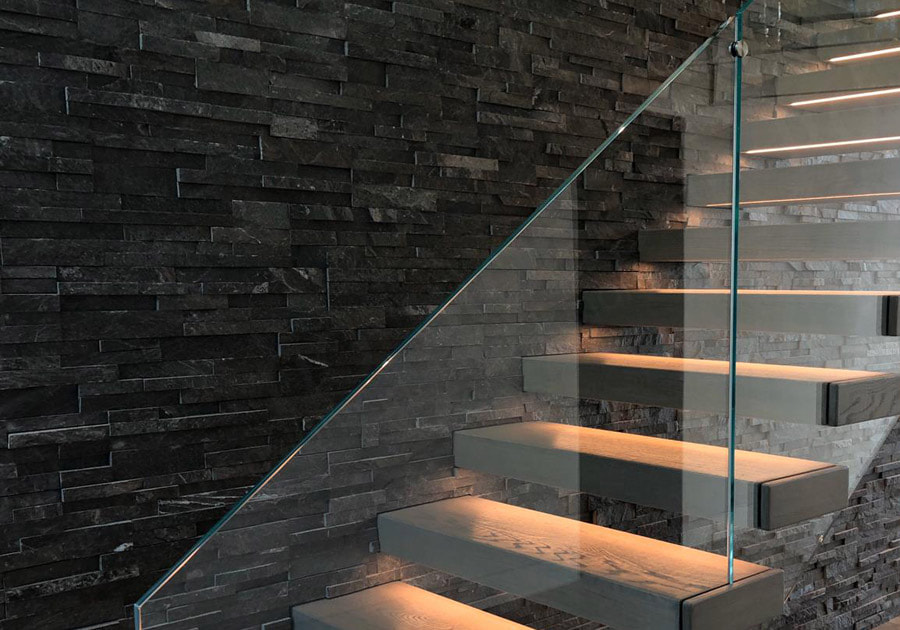Have you ever looked at a textured stone wall and wondered if it’s actually made of stone? The answer is probably modern stone cladding.
Stone cladding is a refined or thin layer of natural/artificial stone, which is applied to an interior (or exterior) wall, to give the effect that it is made entirely of stone. Natural stone is preferred for a more authentic, rustic and durable finish.
Stone cladding itself is said to date back to the late 19th century – historically stone veneer panels were even used in Rome alongside the outside structure of the coliseum. Over the years, cladding has come a long way from this, and is constantly improving.
Traditional CladdingStone is just one of the many materials used for cladding, but you may be wondering what cladding actually is and what’s its purpose.
The definition of cladding, is that the material is designed to be used as an almost ‘second skin’ to a wall, for decorative reasons.
The decorative element speaks for itself as it’s very pleasing on the eye. It gives an element of class to any room and is different to your standard wallpaper or panelling.
When it comes to choosing cladding, there are many types of materials available, such as:
- 天然石材
- Artificial Stone
- Vinyl
- 木头
- Fibre cement
- External foam
- Weatherboard
- Ceramic
- 具体的
- 金属
- Brick
Depending on the type of cladding you go for, stone or not, it should always be done by a professional. The process can be complicated, but in the hands of a trained expert (depending on what type of stone tile, a tiler or stonemason may be required), no stone cladding job is too big, literally.
石材覆层要花多少钱?The cost of stone cladding will be determined according to numerous factors; from how much you need, the material you’re using and the labour time it will take to fit. Although stone sits at the higher end of price in comparison to the other materials, it goes with the saying “you get what you’re paying for”. Natural stone costs between £49-100/m2.
The best way to calculate your costs is to take measurements of the are you wish to clad, then find your desired stone cladding panel system. By working out the size of the cladding fitting onto your surface area, you can achieve a rough estimate. You can also send these measurements across to Norstone for a quote if needed, just to get a more realistic answer.
Even though natural stone cladding may come out slightly higher in price, the benefits certainly outweigh the cost.
The benefits of Stone CladdingIts appearanceStone cladding will dramatically change the look and feel of any wall, pillar, column or surface it is applied to. Its elegance speaks for itself when you see the stunning appearance it portrays. Because natural stone is so unique it can either go down the road of no two colours are the same to being a complete block colour. Because stone gives off such an exceptional look, you can have the option of so many colours and textures that it will completely transform the space you’re using it for.
It's durableThis is a no brainer here, as we all know how tough natural stone is as a material for reference, Norstone cladding is crafted from Quartzite, Marble, Basalt, Lavastone and similar which are inherently durable). This is particularly important if you are using it on a well-used area, such as a fireplace. If you are constantly kneeling or arranging tools around this, you are less likely to cause any damage to stone cladding.

In addition to this is, if you decide to use it on an exterior wall, stone cladding is robust and can withstand the effects from all forms of nature. Come rain or wind, your stone cladding is there to stay. It’s even fire resistant, which is a great added benefit.
It's versatile
Because of its robust nature, you can literally use stone cladding anywhere. Whether this if for a fireplace, outside exterior or even a bathroom, stone cladding has got you covered. If you’ve got a vivid imagination, you can have your stone designed to fit any area in and out of your home. It can be made to fit around your needs, with a spectacular finishing effect. Commercial real estate and architects have been using the stone cladding solution for a few decades now and now it has become a rapidly growing popular choice for homeowners too.
It’ll increase the value of your property
As previously stated, natural stone isn’t the cheapest of cladding, but it's an investment that could pay off further down the line. By choosing natural stone, it may assist you in realising your resale expectations of your property if you decide to sell. Because of its environmental factors and durability, it’s a benefit for potential buyers to invest in.
If you’re using in on your exterior walls, it may enhance your property and add ‘kerb appeal’.
It’s easy to maintain
Norstone will generally recommend that the cladding be treated with a easy to apply water based sealant, both internally and externally as this will keep the cladding in pristine conditions and greatly reduce the need to clean and maintain the surfaces.
It’s unique
Natural stone is quarried not made, so no two pieces are exactly the same - this unique beauty will give you a finish that no one else has. Because stone comes in all shapes, sizes, hues and tints you can expect a lovely variation across a surface, although you may prefer to opt for a honed stone cladding finish (this process smooths all the cladding panels and will greatly unify the colours if you prefer a highly uniform finish). Regardless of your choice of natural stone material, a clad expanse will really make your walls stand out, no matter what room you use it in.
Related questions
How thick is stone cladding?
This can be down to what material of stone you wish to use and what manufacturers advise for the area you’re using it on. For exterior and interior walls, natural stone cladding may be up to 35mm thickness.

